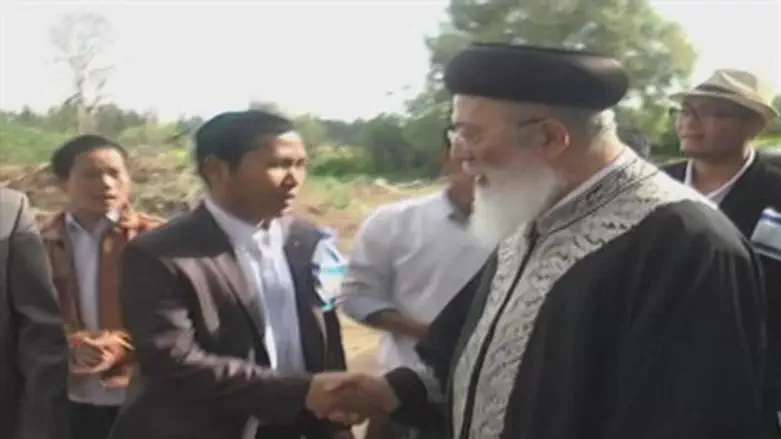
According to participants, the meeting between the Bnei Menashe and the Chief Rabbi was by all accounts remarkable. As the Chief Rabbi’s car approached the absorption center, the Bnei Menashe literally ran out to meet it, singing and dancing along the way until the car could drive no further. The Bnei Menashe then escorted Rabbi Amar into the center where their enthusiasm continued.
Video: Gabi Newman
The organizers say that it was a fitting message for the arrival of a community that traces its roots back 2,700 years to the expulsion of the Ten Lost Tribes by the Assyrians, and that has nevertheless managed to survive – and flourish – in some very distant lands. For Haokip, it was particularly emotional: he has only now been reunited with his parents, who made aliyah from India with Shavei Israel’s help in 2007.
There were also more formal presentations during the meeting with the Chief Rabbi, which lasted an hour and a half. Shavei Israel Chairman Michael Freund surveyed the various activities Shavei is running to enable both the physical and spiritual absorption of the Bnei Menashe, including classes in Hebrew and Judaism, assistance with Israeli bureaucracy, housing, meals, prayer services and more. He also described the successful pace of the conversion progress. Indeed, just a few days after Rabbi Amar’s visit, the final group of Bnei Menashe completed their formal return to Judaism.
Shavei Israel’s Director of Bnei Menashe Aliyah, Rabbi Hanoch Avitzedek, who was in Givat Haviva last week for the meeting, says that the speed in which the conversions have taken place is nothing short of a “miracle. We finished everything in under two months,” he says. “Normally this can take at least two years.” Rabbi Avitzedek attributes the quick movement to several factors, chief among them that “the Bnei Menashe were already living a religious Jewish life in India and came here very well-prepared..”
Rabbi Amar commented during the meeting that the entire process, which Shavei Israel has spearheaded, should serve as a “model” for immigration and conversion for other Jewish communities, and not just the Bnei Menashe.
The next phase of that process – placing the Bnei Menashe in permanent homes in the cities of Acre and Migdal HaEmek – will be even more crucial.